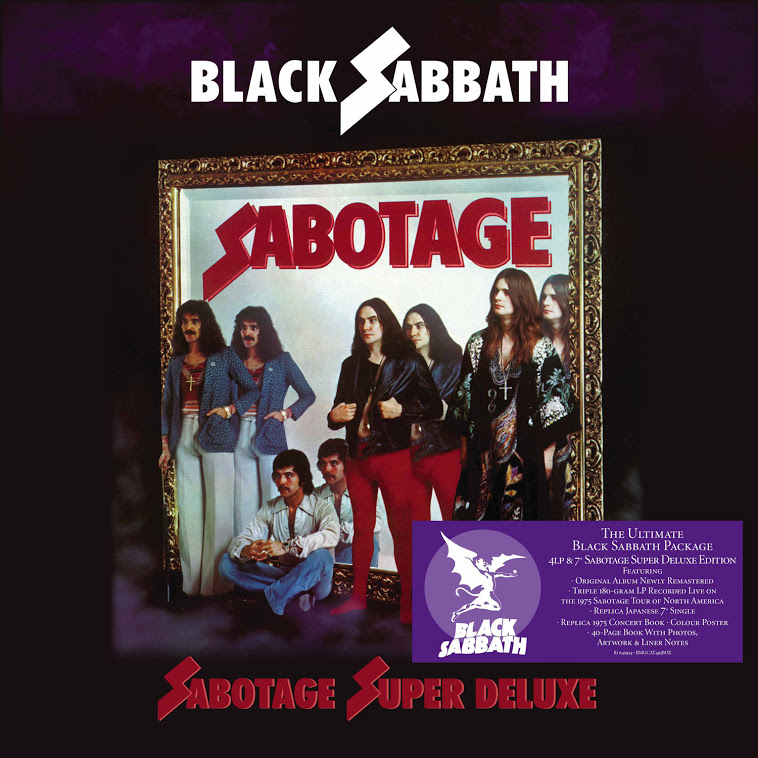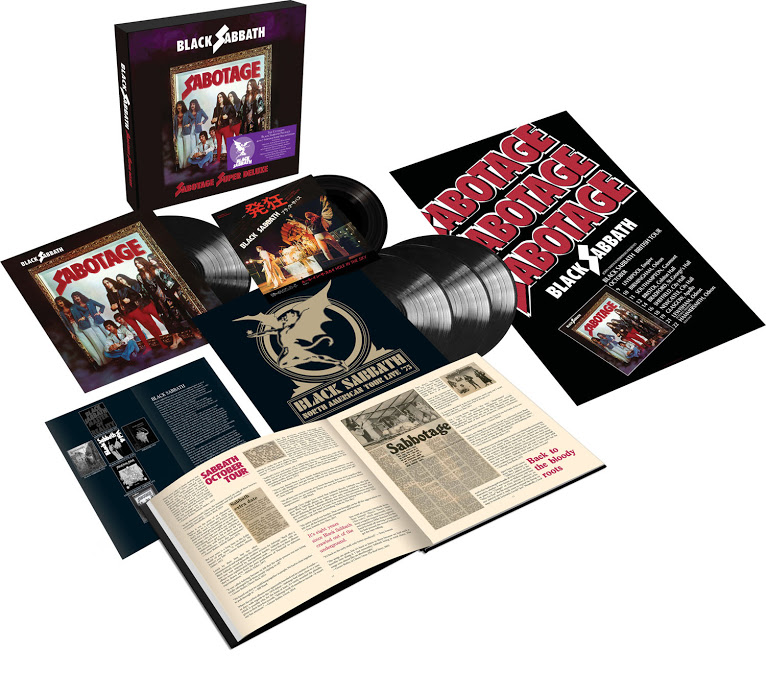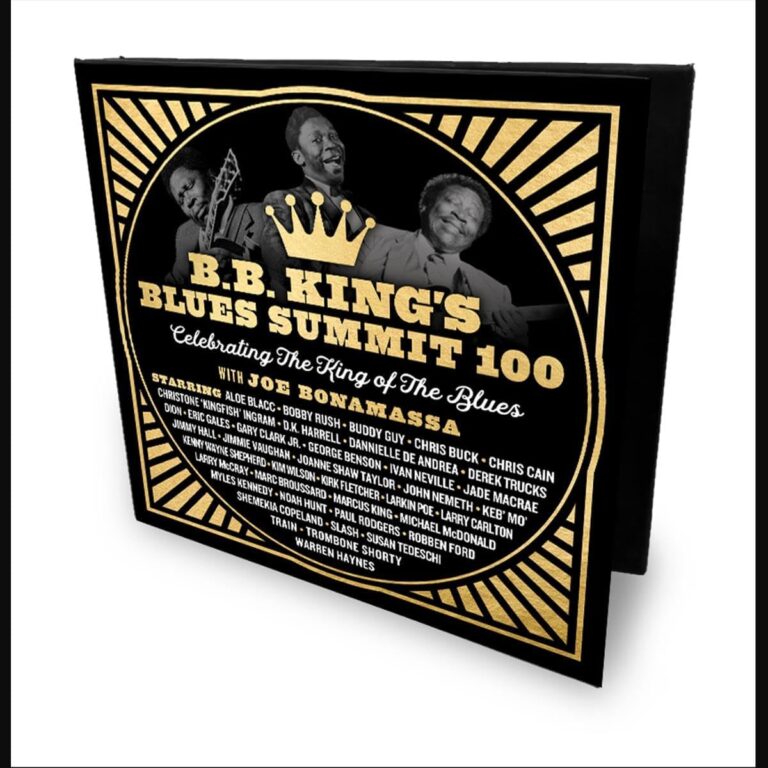
Introduction
As noted in the review for the recent Super Deluxe Edition of Vol 4, Black Sabbath’s catalogue may have been well-served in parts (the first four albums in particular), but there have been significant gaps, most notably the period from 1972 – 1978. The extra-stuffed reissue of Vol 4 did an exemplary job of correcting the lamentable treatment of an underrated album and now a similar effort has been made on behalf of Sabotage. Despite the fact that Sabbath Bloody Sabbath has been ignominiously ignored (another album long overdue a feature-stuffed reissue), there is no doubting the care that has gone into this box set, offering up a definitive take on a powerful record.
The Package As with Vol 4 and Paranoid, Sabotage is packaged in a rigid, lift-top box with the artwork printed on the front and the full track-listing on the reverse. Inside, the original album (remastered) is presented in its original textured sleeve. There’s also a handsome, 40-page hardback book (60 in the CD edition) packed full of period detail, contemporary reviews and archival images; a glossy replica tour booklet (the majority of which is reproduced in the book, but it’s still a nice touch); a replica 7” single of Am I Going Insane (Radio); a massive poster and, the icing on the cake, a beautifully embossed, triple-gatefold live album capturing a complete show from 1975. As with all of these things, how much fans will care for the included ephemera is very much a matter of personal taste, but the quality of the production (especially when compared to the flimsy, paper-back booklets disappointingly included with the Pink Floyd Immersion sets) is second to none.
Audio Content: Unlike Vol 4, there are no illuminating studio snippets included with Sabotage and the set is correspondingly shorter. The album is newly remastered, but otherwise stands alone in this set. This is a shame but, perhaps, there was nothing worth salvaging from the notoriously febrile sessions. Instead, this box set opts for a triple vinyl offering up a complete 1975 show. Thirteen of the sixteen tracks in the set are previously unreleased and, despite some commonality with Vol 4., seven tracks (nine if you include the jam tracks), are not found in that release, making the set something of a must for collectors. The 7”, meanwhile, offers little in the way of enticement, save for a single edit of Am I Going Insane (Radio), but the rarely seen Japanese cover looks cool, and it’s more something to keep within the box than play regularly.

Sabotage Revisited
With its textured sleeve, Sabotage very much feels like a relic of its time. Graced with perhaps some of the ugliest album art ever to be released by a major band, it’s not something to spend any great amount of time contemplating, but this new edition compares well with an original press that still sits on my shelf, the only changes being the omission of some marketing and printing credits and a shift in the liner bag colour from white to a more-fitting black.
Overshadowed by events (the album was recorded amidst legal wrangles with former manager Patrick Meehan – hence the title), Sabotage takes on a darker tone, as befitting material recorded while the band were busy signing legal affidavits, sometimes at the mixing desk itself! Of course, it is a long-held truth that bands are at their most creative while at their most desperate, and certainly Sabotage boasts a number of killer cuts that have been long-covered by disciples from across the metal community, most notably Hole In The Sky and Symptom Of The Universe. Nevertheless, despite a heavier sound than its predecessor, Sabotage still saw the band continue to experiment – a situation that displeased some (Ozzy memorably complaining that the album took forever to complete), adding to the tensions that would eventually see Sabbath’s first iteration break up.
Sabotage gets off to a tremendous start with Hole In The Sky, an all-time classic riff from Tony Iommi launching a thousand doom bands in the process. This truly is Sabbath at the gnarly best, the crashing riffs, thunderous bass and propulsive percussion still sounding fresh today, and providing the perfect backdrop for Ozzy’s ferocious vocal. Remastered by Andy Pearce and Matt Wortham, the audio once again sounds pristine and, as the blink-and-you’ll-miss-it instrumental of Don’t Start (Too Late) demonstrates, none of the dynamic has been sacrificed. After the short, sweet palette cleanser, the band are back on the rampage with another Sabbath classic in the form of Symptom Of The Universe. With Ozzy’s vocal straining at the leash and the riff almost punk in its thuggish simplicity, Symptom Of The Universe is a track so ingrained on the consciousness that you anticipate every brutal note before it lands, yet familiarity has done nothing to dull its impact and, freshly remastered, it sounds as vital as it did the first time you heard it. Side A concludes with the lengthy Megalomania and it’s here that the album really steps out on its own, the band incorporating an earthy psychedelia into the mix, multi-tracking Ozzy’s vocals and swathing the track in reverb. It’s a bold, elegant production that brings Megalomania to life, the band experimenting with numerous studio effects to really immerse the listener, and there’s a progressive sweep to the track itself that shows just how accomplished Sabbath had become as songwriters by this point.
Side B opens with The Thrill Of It All, a blizzard of multitracked guitars and heavy, heavy blues riffing nailed by Bill Ward’s industrial strength drumming. Yet, just as you think you’ve got the piece figured out, in comes piano and synth, all paving the way neatly for the gloriously overblown Supertzar. With the English chamber Choir on board, Ozzy legendarily left the session thinking he’d wandered into someone else’s recording! Surprisingly similar to the Floyd’s excursions on Atom Heart Mother, Iommi’s electrifying lead work notwithstanding, Supertzar not only showcases the band’s ambitious approach to album creation, it also provided the perfect intro tape for the live shows that followed. As much as it’s a good track, the synth-led intro to Am I Going Insane (Radio) feels incongruous after the dense choral noise of Supertzar, and you can’t help but feel the band would have been better to put a segue, similar to Don’t Start between the two. Nevertheless, the track is notable for presaging Ozzy’s solo career (still some four years down the line). As with side A, side B ends with an epic in the form of The Writ. One of the band’s angriest songs, the title was inspired by the increasingly litigious events invading the studio, and you can feel the tension in Ozzy’s throat-ripping vocal. It draws a line under a hugely powerful entry in Sabbath’s storied canon and, revisiting it here in remastered form, it’s a ferociously vital album and its influence continues to rumble through heavy metal today.
North American Tour Live ‘75
With no obvious credits as to who produced the thing, a certain mystery surrounds when and how this triple vinyl was mixed. The set itself appears to be a much-bootlegged recording of the band’s show on 5th August at the Convention Hall in Asbury Park, New Jersey. Several tracks (Hole In The Sky, Symptom Of The Universe and Megalomania) appeared on the 2002 deluxe reissue of Past Lives, which was remastered by Andy Pearce, but no information is provided to tell us who prepared the full audio for release here. Nevertheless, North American Tour Live’ 75 is surprisingly powerful, for all that its rough and ready, and it captures the band on impressive form.
Opening with the briefest of snippets of Superstzar (rudely interrupted by an announcement welcoming Sabbath to the stage), the album properly starts with a seriously antagonistic take on Killing Yourself To Live. With Ozzy singing like a man possessed, this is an admirably raw document of the 1975 shows and, as he leads the audience through a Hole In The Sky (“Are you high? So am I!”), you can sense the energy in the auditorium, an energy that hits fever pitch when Ozzy announces Snowblind – a Vol 4. highlight that sparks a loud cheer more than justified by Iommi’s blistering lead work.
Side D (the box set labels the vinyl sequentially starting with the original album) contains just two tracks and opens with the hulking Symptom Of The Universe. It’s strange to hear Ozzy slightly uncertain as he introduces a track from a new album, but his cry of “all right” as Iommi unleashes the now-classic riff is entirely unfeigned in its delight. The rest of the disc is taken up with a cataclysmically heavy rendition of War Pigs, sounding more funeral than ever, at least until the leaden introduction gives way to the clap-along-with-Ozzy first verse. A powerful take on a now familiar song, War Pigs never fails to set a Sabbath set on fire, and this version is no exception.
Another new song is welcomed into the fold on Side E as the band dip their toes into the waters of Megalomania. By now, with the audience very clearly on side, Ozzy sounds a whole lot more confident in the introduction and the track’s atmospheric darkness provides a welcome change of pace. Despite a touch of distortion in the mix, Ozzy’s vocals are particularly impressive here, and the shift from the brooding verse to the bruising riff-fest of the chorus is handled particularly well. Rounding out Side E, (and following a short bout of tuning and other shenanigans), the bluesy swagger of Sabbra Cadabra is delivered with thuggish intensity, although the chorus remains as incongruously catchy as it is on record.
Side F sees the band indulge in two lengthy jams, the first of which being an instrumental featuring a guitar solo, while the second has a Zeppelin vibe and a drum solo. In all honesty, these are incredibly indulgent (albeit very representative of their time) and, although it’s easy to imagine the audience digging it in the heat of the moment, for the home listener, the only reason to bother with this side is a short, albeit blistering, Supernaut nestled away at the end of the disc.
Side G opens with the ubiquitously awesome Iron Man, already a classic just five years after its release. With Bill hammering the drums slowly into the foundations of the stage, the guitar riff sounds unhinged in this rendition, and it simply pisses over recent live recordings in terms of sheer weight. Another lengthy Guitar Solo (Orchid / Rock ‘n’ Roll Doctor) will cause some to roll their eyes a touch, but fortunately, there’s the ominous proto-doom of Black Sabbath waiting in the wings to draw you back to the dark side. An epic version of the track, it does not disappoint, and it paves the way for the concert’s conclusion on the final side of vinyl.
Side H opens with the sound of a gong, before the band explode into Spiral Architect as Ozzy shouts “we love you all!” Always a strangely chilled track, with the quasi-orchestral sounds of the mellotron (played by Jezz Woodroffe), Spiral Architect remains something of an oddity in the Sabbath canon, and it’s good to hear a live rendition. The final two tracks echo the Vol. 4 release as the band conclude with Embryo / Children Of The Grave and Paranoid. A well-worn, and powerful finale, it’s nevertheless strange to hear an audience not weaned on the tracks going mental, and it’s live recordings like this that help to fully exemplify Sabbath’s enduring influence on heavy metal.
Final Thoughts
As with Vol. 4, there is no doubting the quality of what is on offer here and Sabbath fans will undoubtedly love this set. The extent to which the absence of demo material is a loss is debatable. On the one hand, the Steven Wilson mixed extras on Vol 4. Were (predominantly) of high quality and interest value for collectors. On the other hand, the triple vinyl live concert found here is more listenable on a regular basis, and a good deal of care has been taken to avoid too much crossover with the earlier set (although certain tracks, such as War Pigs are unavoidable). While the 7” is more of a curio than a practical addition to the box, the hardbacked book is packed full of detail and period memorabilia, making it a wonderful companion to the album, and the only real complaint is the absence of a download code, which does feel just a touch mean considering the cost. Overall, with gorgeous packaging and high quality pressings across the board, this is complete a set as could possibly be hoped for (especially given the notoriously difficult recording sessions that gave birth to Sabotage), and it’s most certainly a worthwhile addition to any Sabbath fan’s collection. 8/10



